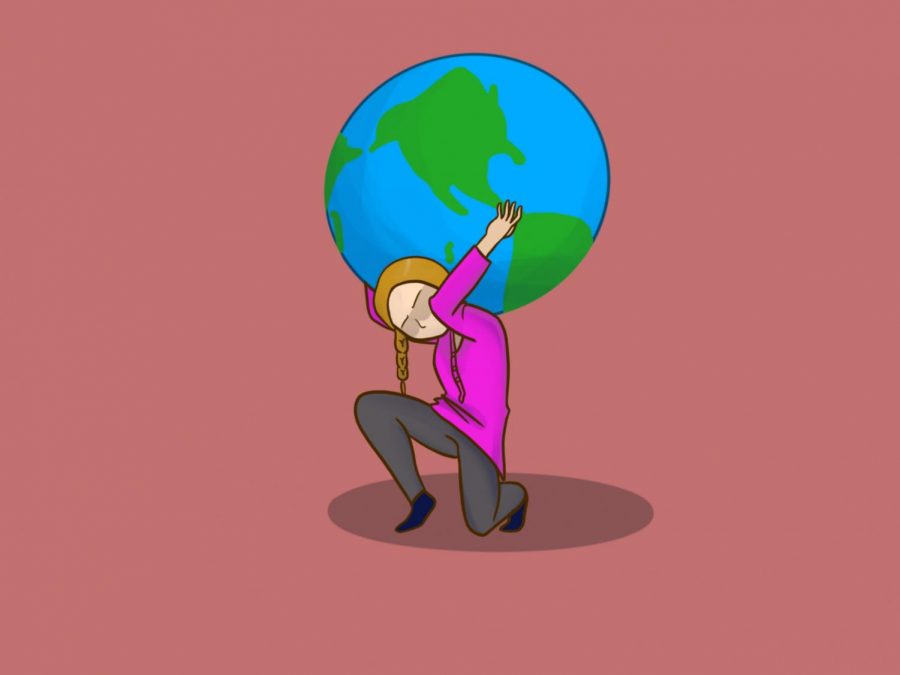The Greta Effect
There are others leading this movement, too.
October 2, 2019
Greta Thunberg is the globally recognized face of the youth for the climate change movement. Last week, she delivered a powerful speech at the United Nations headquarters in New York City advocating for immediate global legislature that will cut radically cut carbon emissions by more than half immediately, not just in 10 years.
Thunberg is an inspiring individual, yet it’s also important to unpack why the world has fixated on a young, white girl as the face of such an important movement.
Thunberg herself has acknowledged in her U.N. speech that she is one of the “lucky ones.” Her race has enabled her to gain popularity. White privilege is not a new phenomenon and Thunberg acknowledges she benefits from it. There are plenty of young people of color who are accomplished in their activism. Why are their names so unknown compared to Thunberg’s?
Autumn Peltier, a Native American 13-year-old activist, is advocating for clean water. Mari Copeny, also known as Little Miss Flint, advocates for clean water in Flint, Mich., in a movement that is now gaining fame for its aspect of environmental racism. Xiuhtezcatl Martinez is another 16-year-old indigenous activist who stands for Standing Rock’s Dakota Pipeline protest. All have contributed heavily to the environmental protection movement. None have gained recognition for their work in ways Thunberg has.
Thunberg’s parents are also accomplished individuals with connections. Her mother, Malena Ernman, is a professional opera singer and her father, Svante Thunberg, is an actor, author and producer. Thunberg’s parents published a book about sustainability and environmental responsibility that helped propel her global fame.
In another aspect, the fact that the world clings so tightly to a young teen is deeply saddening. In her U.N. speech, Thunberg is clearly distressed by the lack of global political movement for climate change, evident when she said older generations have “stolen [her] dreams and [her] childhood with [their] empty words.” In later articles that analyze Greta’s speech, headlines that say she “condemned” the U.N. with an “emotional” or “scathing” speech entice readers to click on links to her speech. In a way, it seems like the media profits off the trauma of young people for clickbait. Why not just advertise as “Greta Thunberg’s U.N. Speech” instead of competing for internet foot traffic by using adjectives that scandalize Thunberg’s distress?
Thunberg’s fame is worrying. How much stress can a young girl take? 16-year-olds should not be burdened with representing a global movement; they should be figuring out who they are and who they want to be. Older climate change advocates shouldn’t stand idly by as one young person leads a global effort to save the world, especially since it was never simply Thunberg’s responsibility.
The focus of a global movement should not fall on one individual. While it is common, it is an overwhelming responsibility, especially for a young person. Greta Thunberg is an inspiration to us all, yet we shouldn’t rely solely on her for change. It’s important to recognize other activists and give them the support they deserve as well. Most importantly, we need to support legislation that helps the climate and continues to advocate for a movement that impacts us all.



















Karen C, Watson • Oct 5, 2019 at 5:56 pm
While Greta Thunberg has the advantage of being a white student from a successful and loving family, she also has quite of baggage to deal with. Considering the way most people view her diagnosis of Aspergers syndrome, life has not been easy for her. A lot of people judge her demeanor and affect in a very negative way and consider her weird and abnormal. This is very painful and discouraging to any young person growing up. I admire her strength and fortitude in this battle! There is plenty of room for many young people to become leaders in this movement. Tenacity and devotion along with sacrifice will bring its own rewards. The goal is saving our planet, not necessarily personal fame or recognition on a grand scale. The young people are the inspiration to all and will be leaders of all!